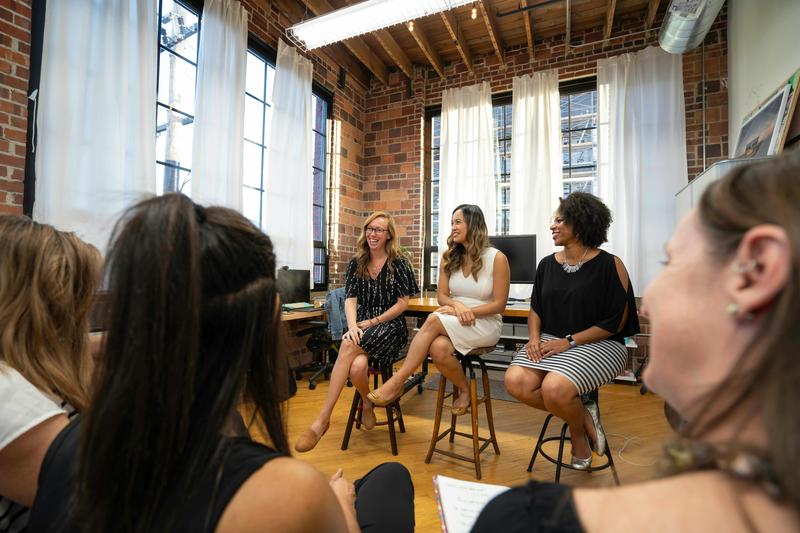Are You Waiting for Someone to Tell You What to Do With Your Life?
Have you ever found yourself going along with something—whether it’s a decision, a belief, or even a life path—only to look back and wonder… Wait, was that actually what I wanted?
It happens so subtly. Maybe you took career advice from someone who “seemed” successful, even though their lifestyle doesn’t match what you truly want. Maybe you stayed in a relationship or friendship too long because the other person seemed so sure about what was “right” for you. Or maybe you’ve caught yourself waiting for someone—a mentor, a book, a course—to tell you exactly what to do because making the choice yourself feels overwhelming.
If any of this feels familiar, it’s not a random mistake. It’s a trained response—one that keeps us unconsciously handing our power over to external voices, often without realizing it.
The Silent Pattern That Makes You Doubt Yourself
Most people assume they’re making conscious choices, but the truth is—without realizing it—we often operate from a trained mental and emotional state that defaults to external guidance instead of inner clarity.
Conditioned helplessness happens when, over time, your system learns that your choices don’t lead to real change. If, growing up, you were constantly shut down when you spoke up, ignored when you shared an opinion, or told what to do without being asked what you wanted, your nervous system may have learned: What I think doesn’t really matter.
And once this pattern is set, it shows up everywhere—making it feel safer to follow someone else’s lead than to risk making a wrong decision on your own.
I had a client once who struggled with this in their relationships. They kept seeking advice from friends, books, and experts, constantly second-guessing their own feelings. Every time they met someone new, they would overanalyze what others thought—rather than checking in with themselves about whether the connection actually felt right.
The problem wasn’t the advice—it was that their nervous system was conditioned to look outside itself for certainty instead of trusting their own emotional clarity. Once they started training themselves to recognize and regulate their emotional state, they stopped over-relying on external validation and started making choices that truly aligned with them.

The Confidence Illusion: Why We Trust Loud Voices
Here’s something surprising—our brains are wired to trust confidence over accuracy.
Someone can say something completely false, but if they say it with enough certainty, our subconscious assumes it must be true. This is why we tend to listen to people who speak with conviction, even when their advice doesn’t actually serve us.
This is why so many people get drawn into gurus, influencers, or even just that one friend who always seems to know what’s best for everyone. If you’ve ever felt swayed by someone’s certainty—only to later realize it wasn’t the right choice for you—you’re not alone.
But confidence is just a learned behavior. It doesn’t necessarily mean wisdom or truth. And if we don’t train ourselves to recognize this, we can end up following someone else’s version of success instead of our own.
If you’ve ever second-guessed yourself around a confident person, thinking they must know something I don’t, recognize that this is just your nervous system reacting to perceived authority. The more you train your emotional state to stay neutral in these moments, the easier it becomes to assess whether the information actually aligns with you.
The Subtle Way Others Shape Your Life (Without You Noticing)
When we don’t have clarity on what we truly want, we become more susceptible to people who think they do know.
Ever had someone tell you exactly what you should do with your life? “You should move here, take this job, date this kind of person, follow this plan.” Sometimes it’s well-intentioned, but often, it’s just projection—them imposing their values onto you.
And if we aren’t fully anchored in ourselves, it’s easy to internalize these expectations without questioning them. We start living by someone else’s map, following a life path that was never ours to begin with.
The tricky part? It doesn’t always feel like pressure. It can come from the people we admire, the mentors we look up to, or even just the collective expectations of society. And if our nervous system is trained to seek safety in external certainty, we won’t even notice it happening.
This is why building internal clarity isn’t about rejecting guidance—it’s about training yourself to assess whether something actually aligns with you.

How to Start Reclaiming Your Power
The shift happens when we start training our mental and emotional responses instead of just reacting automatically.
- The next time you feel drawn to follow someone’s advice, pause. Ask yourself: Am I choosing this because it resonates with me? Or because it feels easier to trust their certainty than my own inner knowing?
- Notice where you feel small hesitations. Those little gut feelings that something isn’t fully aligned—that’s your internal wisdom trying to get your attention.
- Remember that certainty isn’t wisdom. The loudest voice in the room isn’t necessarily the most accurate one.
This isn’t about rejecting all guidance. It’s about training your system to stay calm and clear enough to recognize what’s actually aligned for you. The more you practice this, the easier it becomes to see when you’re making a decision from your own clarity versus reacting to someone else’s conviction.
An Invitation
Reclaiming your power isn’t about making perfect choices—it’s about training yourself to recognize when your system is reacting on autopilot versus when you’re making a conscious choice. The ability to do that isn’t something we’re born with—it’s something we develop through intentional practice.
This is exactly the kind of work we do in Pathway to Personal Mastery. If you’ve ever felt like your decisions are influenced more by external voices than your own inner clarity, this process helps train you to notice and shift these conditioned patterns in real time.
You’ll build the ability to regulate your emotional responses, create internal certainty, and make choices from a place of deep alignment.
If you want to dive deeper into this work, I’ve got some free resources you can check out. Find me on Instagram @mikewangcoaching for insights and conversations around these topics. And if you want regular inspiration on developing mental and emotional mastery, sign up for my weekly newsletter—it’s free, and I pack it with valuable takeaways you won’t find anywhere else.

